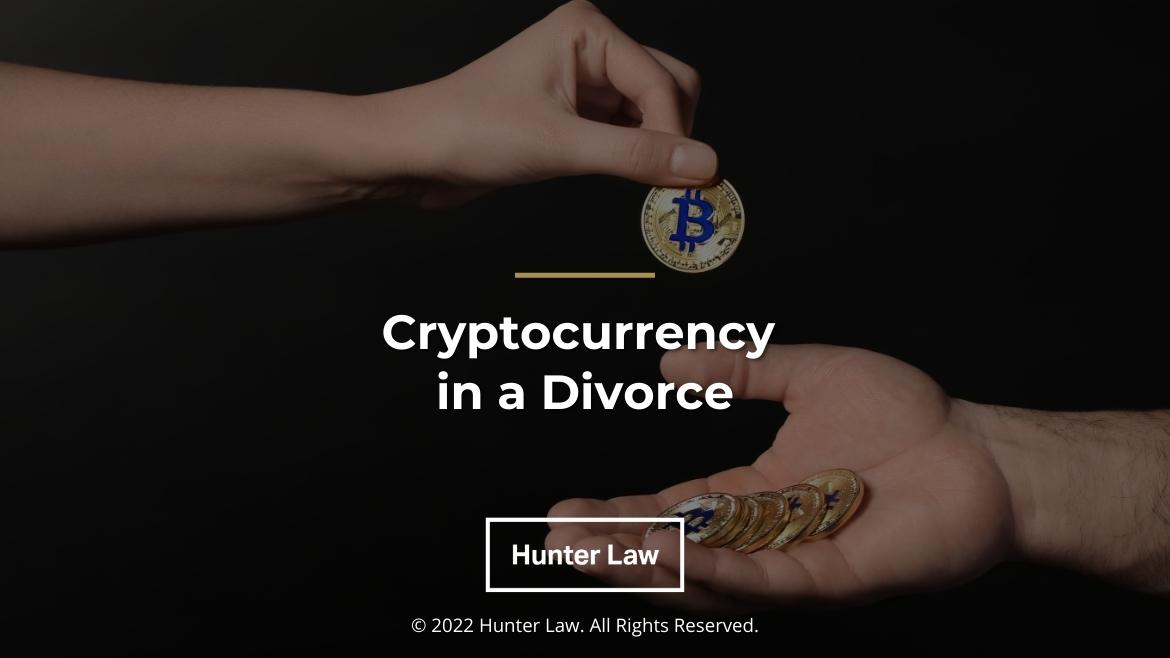Dividing assets is a standard part of any Florida divorce case. But while this could be simple with classic assets such as a family car or old wedding gifts, things get a little trickier when it comes to cryptocurrency: digital tokens of potentially massive value around the world.
Not sure how cryptocurrency is divided in a divorce or how it may affect proceedings? Read on to learn more about how cryptocurrency is considered in a typical Florida divorce case.
How is Cryptocurrency Classified as an Asset?
Thanks to a recent decision by the Florida Supreme Court in late 2020, cryptocurrencies such as Bitcoin, Ethereum, and more are fully classified as digital assets and are affected by common divorce proceedings/asset rulings.
In a nutshell, the currencies have to be divided between spouses the same way that other marital assets might be during a Florida divorce.
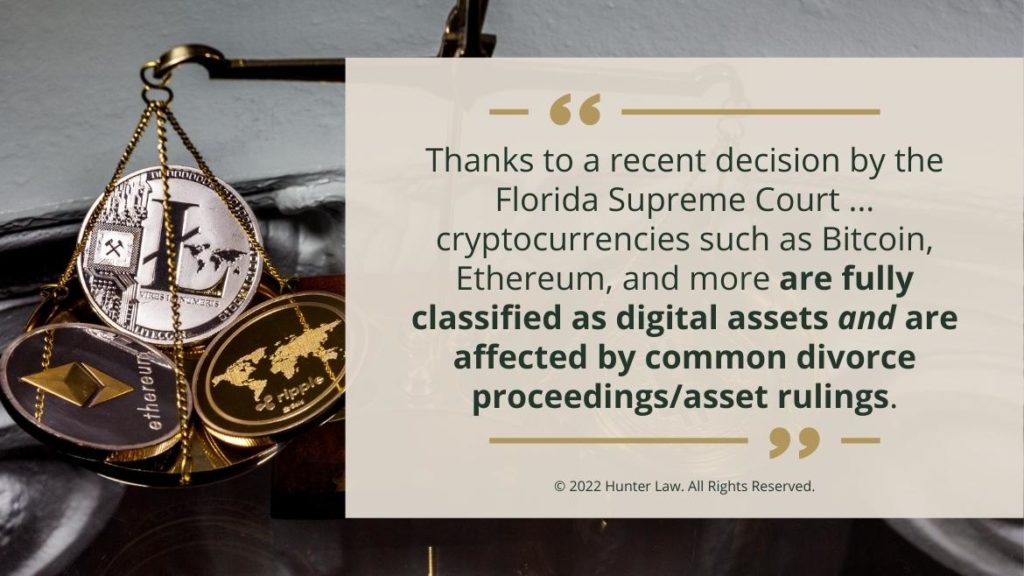
For example, if your spouse has cryptocurrency of one type or another, then says they do not want to split the cryptocurrency with you during the divorce, you are allowed to bring this to the attention of the judge. In all likelihood, you will receive some share of the crypto coins depending on other factors.
Is Cryptocurrency Divided Equally Between Divorcing Parties?
Sometimes.
Under Florida state law, most marital assets (including anything purchased or otherwise accumulated by the spouses over the course of their marriage) must be divided evenly between both parties.
For example, if you purchased a house with your spouse after marriage, the home’s value or equity would be divided between the two of you. Alternatively, you may negotiate a property exchange so that you or your soon-to-be former spouse receive property of equal value to the home.
However, cryptocurrency is not as simple or as universally valued as traditional marital assets like homes, cars, and other physical property. A Florida divorce court may divide cryptocurrency assets in one of four ways:
- Dividing the cryptocurrency equally or in some other proportionate system. Both spouses receive or keep cryptocurrency in its digital form (i.e. Bitcoin)
- One or both spouses doesn’t wish to set up a cryptocurrency account, so a third-party custodian receives a share of cryptocurrency and holds it until the divorce is final. The custodian then liquefies the asset after the final ruling and one or both spouses receive the crypto’s value in a fiat currency of their choice.
- Crypto liquidation, in which the former spouse who owns the crypto will convert the other party’s share of the coins into cash. For example, if one spouse wants to keep Bitcoin but the other wants cash, the spouse who wants cash will receive it based on their share of the Bitcoin
- No claim of cryptocurrency. If one spouse agrees that the spouse who purchased the crypto or Bitcoin can have it, there’s no contest for the digital asset and the second spouse keeps it all
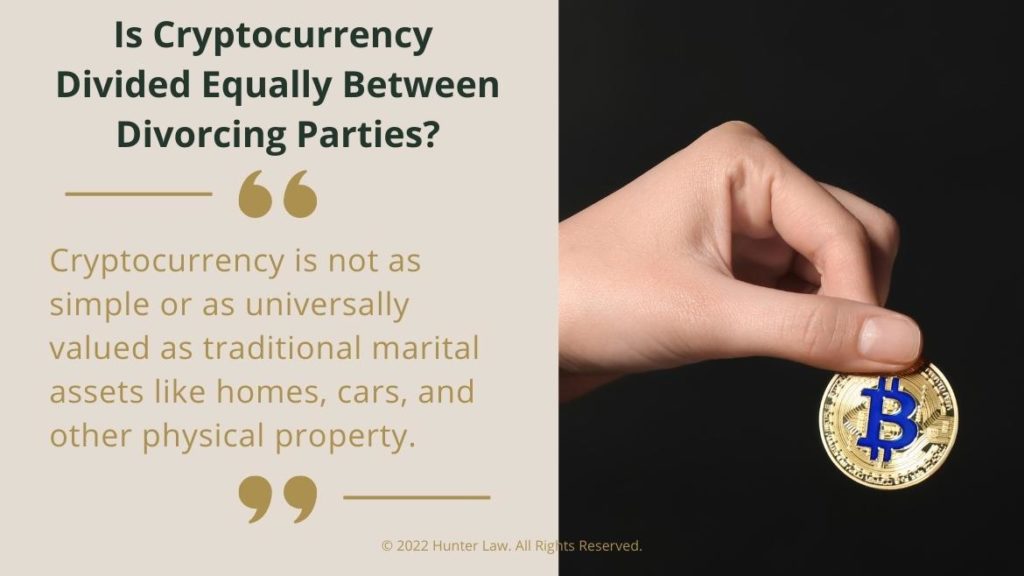
Your Florida divorce attorney may be able to advise you on which decision is most suitable for your goals.
Things to Consider When Dividing Cryptocurrency Assets in a Divorce
Due to its inherently digital nature, dividing crypto assets is a little more complex than dividing traditional marital assets.
Current and Future Value
For starters, spouses and a divorce court must consider the current and future value of any cryptocurrency. Bitcoin’s value, for example, has both dipped and skyrocketed by massive amounts in recent months.
Any given crypto coin may be valuable at the time of divorce proceedings but could be valued much more or much less in a few months. Therefore, both spouses should consider the potential long-term value of cryptocurrency before fighting over it or deciding how to split up the digital asset.
Time Acquired
Some crypto coins, including their digital wallet (which is used to store cryptocurrency), may be acquired by one or both spouses before they were married. In such cases, some or all of a cryptocurrency may not be counted as a traditional marital asset.
For instance, if a husband purchases Bitcoin prior to marriage, then marries his wife, the Bitcoin he purchased may not be divisible and his wife may not have any claim to the coins.
But if new crypto coins were purchased after marriage, those coins specifically could be subject to marital asset division rules.
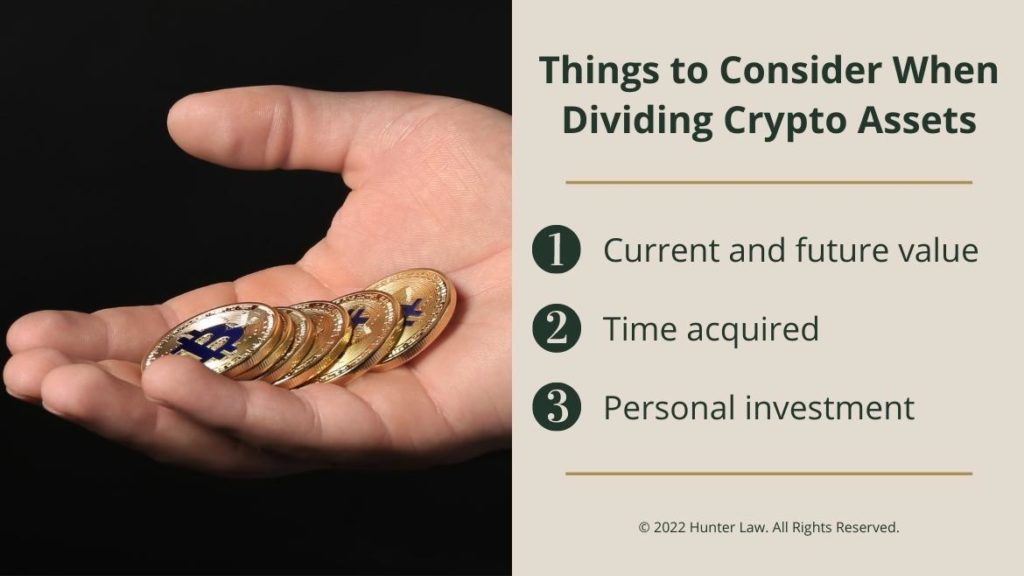
Personal Investment
Lastly, both spouses should consider how personally invested they are in the cryptocurrency in question. Despite its growing popularity, many people don’t believe that cryptocurrency is a lasting phenomenon.
Some spouses may not wish to have crypto under their name. In exchange, they may negotiate for other property worth an equal estimated value for the crypto coins they are giving up.
What to Do if You or Your Spouse has Cryptocurrency
If you or your spouse has cryptocurrency, keep two major things in mind.
Be Honest
First, always be honest if you have a crypto wallet and any Bitcoin or other crypto tokens under your name. Any lawyer worth their salt will discover if you have digital assets you don’t announce during the initial divorce meetings.
Failure to explain your crypto holdings to the court could leave your case in a much worse position in future negotiations. Even if you have cryptocurrency but lost the private key to your digital wallet (and thus can’t retrieve your cryptocurrency), tell the court about all digital assets under your name.
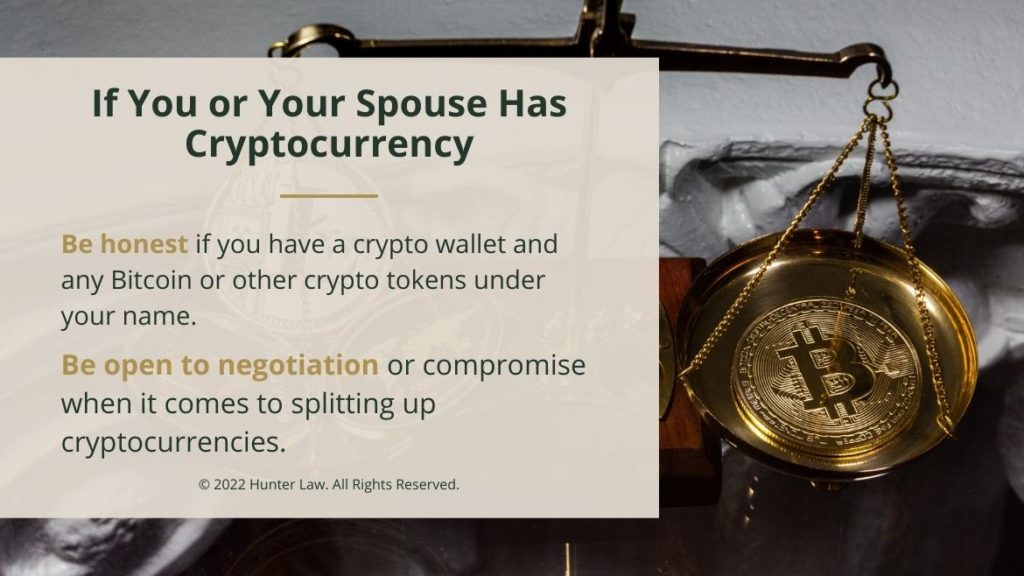
Be Open to Negotiation
Next, remember to be open to negotiation or compromise when it comes to splitting up cryptocurrencies in the divorce process. The actual value of these digital tokens is highly speculative, so odds are some compromise will be necessary so that both parties feel they reach an equitable agreement.
Contact a Florida Family Law Attorney Today
Ultimately, dividing cryptocurrency is just one more complex affair in the lengthy and stressful Florida divorce process. Hunter Law Group can help you navigate the legal intricacies inherent in any divorce case and advise you when it comes to dividing cryptocurrency or negotiating for other digital property.
Contact us today for a free consultation and more information.


